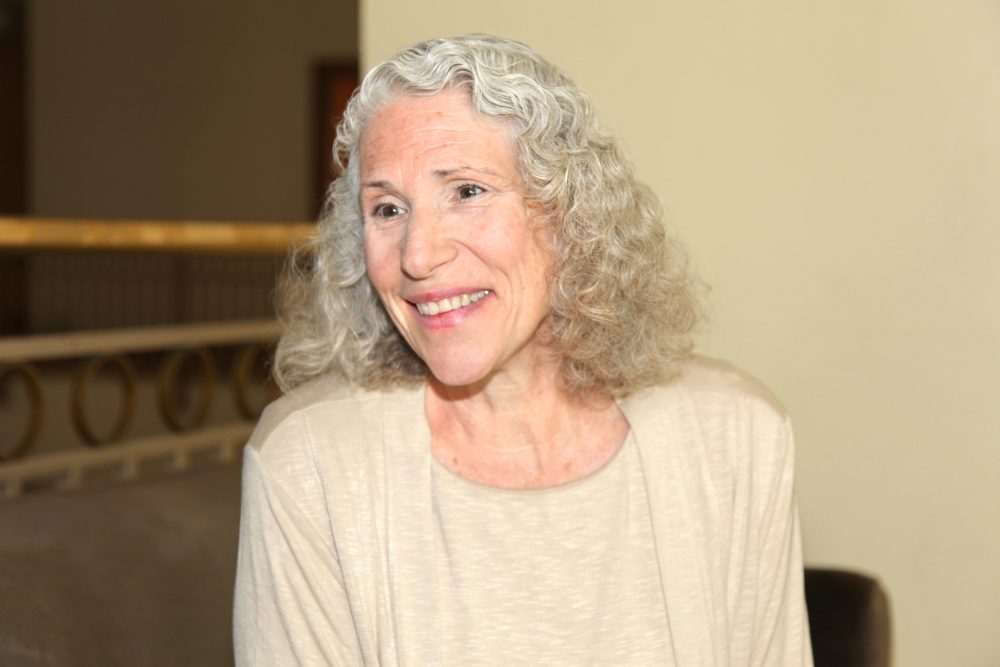
Photo by Aaron Salcido.
Lynne Conner is a cultural policy theorist, theater and dance historian, and playwright who has written several books, including Audience Engagement and the Role of Arts Talk in the Digital Era. She is currently the chair of the theater department at the University of North Carolina at Charlotte. Before participating in a panel asking “Does Art Really Make Us Better Citizens?” at a Zócalo conference in downtown Los Angeles entitled “What Can the World Teach California About Arts Engagement?” she answered some questions in the green room about plants, persistence, and resisting magic formulas.
What’s the most memorable performance you’ve ever seen? I imagine you’ve seen many.
Thousands and thousands … When I was in my early 20s I went to see a production of Measure for Measure at the Three Rivers Shakespeare Festival, which was a fairly large Shakespeare festival located in Pittsburgh, Pennsylvania, run out of the University of Pittsburgh there. And the way in which the setting, and the themes working through the setting, were interpreted was a complete revelation to me, and made me see Shakespeare differently. It made me see feminism loaded into the arts for the first time in my life. And it led me into a greater understanding of what theater and the arts can do for me.
What’s the most memorable performance you’ve ever directed?
I would say that the most aesthetically satisfying production that I’ve ever directed was a production of Mary Zimmerman’s Metamorphoses. That was a beautiful blending of a variety of different disciplines and that was very meaningful to me. I’ve also directed my own plays and my own plays are socially conscious works that are really involved in social justice motivations—so ultimately I’d have to say that that’s been the most important to me.
Is it harder to direct your own work than it is to direct someone else’s?
It’s kind of a ridiculous thing to do. It’s a ridiculous proposition, because the whole notion of theater as a collaborative art is that you’re working with other people. But, that said, sometimes it’s necessary and sometimes it can be really very gratifying.
Do you have a favorite plant?
I do! I would say that my favorite plant is a lilac bush.
Are there many in Charlotte?
Yes, and different varieties, too, that I’ve never seen before.
What’s the best advice you ever received?
The best advice—as a professional, not as a human being—the best advice I ever received was when I was complaining, moaning, crying about a bad review and I said to a friend of mine, “How do you handle it when you get bad reviews?” And she said: “If it’s bad it doesn’t exist. If it’s bad all I think about is my next project.” And I have never forgotten that. Just move forward, move on.
What do you wake up to?
I wake up to exercise. I always exercise right after getting up. Before eating, before doing anything else.
What do you do for exercise?
Everything. A whole bunch of different stuff.
What word or phrase do you use most often?
I think I probably overuse, “That’s wonderful!”
What’s your favorite pizza topping?
Black olives. Cured black olives.
Do you have anything you love to hate?
I guess I love to hate political discourse in all of its varieties.
When are you at your most creative?
When I was younger I thought it was a magical formula that I couldn’t predict. In the last 10 or 15 years of my life I’ve discovered that I am most creative in the period of time after I have forced myself to work diligently on a regular basis. So whether it’s writing a play, whether it’s writing an academic book, whether it’s singing—I’m an amateur jazz singer—I’m most creative after I’ve put in a bunch of time that feels terrible. And then there it is for me. It’s available to me.
What superpower would you most like to have?
I would most like to really actually be satisfied with what’s in front of me right here and right now. That would be an astonishing superpower. To just appreciate and be right here. I don’t have that superpower.
And that’s a goal of aesthetic experience, too, right?
Yes.



